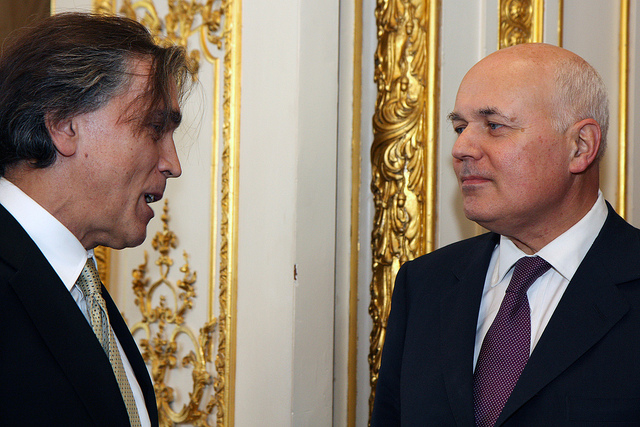Iain Duncan Smith’s resignation was the most confusing since Gladstone left the (Conservative) government of 1845
Iain Duncan Smith, the former Conservative Party leader, recently resigned as Secretary of State for Work and Pensions. His decision was controversial, with many suggesting that it had more to do with the European Union than it does with his stated reason of cuts to Personal Independence Payments. Here, Alun Wyburn-Powell takes a look at the perplexing resignation of an often perplexing man.
It is a rare feat for a part-Japanese Catholic to get his first job in cabinet seven years after stepping down as Conservative Party leader. Iain Duncan Smith (IDS) achieved this unusual order of appointments, but on 18 March 2016 he resigned from David Cameron’s cabinet after six years as Work and Pensions Secretary.
Iain Duncan Smith’s resignation has been the most confusing since Gladstone resigned from the Conservative government of 1845. Gladstone was a member of Peel’s ministry which proposed increasing the annual grant to the Maynooth Seminary for training Catholic priests in Ireland. Gladstone had previously argued that a Protestant country should not pay money to other churches, but he supported the increase in the Maynooth grant and voted for it in the Commons. However, he resigned rather than face the charge that he had compromised his principles to remain in office. Peel confessed himself confused over Gladstone’s actions.
David Cameron claimed that he was ‘puzzled’ over Iain Duncan Smith’s resignation from his cabinet, writing: ‘I regret that you have chosen to step down from the Government at this moment. Together we designed the Personal Independence Payment to support the most vulnerable and to give disabled people more independence…we collectively agreed – you, No 10 and the Treasury – proposals which you and your Department then announced a week ago. Today we agreed not to proceed with the policies in their current form and instead to work together to get these policies right over the coming months. In the light of this, I am puzzled and disappointed that you have chosen to resign.’
IDS perversely claimed that he had relinquished responsibility for his departments as he was ‘unable to watch passively whilst certain policies’ were enacted. He also insisted that his resignation was nothing to do with the forthcoming EU referendum.
Iain Duncan Smith’s correspondence with the Prime Minister ranks among the more terse, turgid and ungrateful of resignation exchanges. David Cameron (unnecessarily) pointed out in his letter that he and IDS are on opposite sides in the EU referendum debate. But, Duncan Smith’s supporters in the debate have been offering him conspicuously faint praise, as in the case of Jacob Rees-Mogg who said that IDS had been ‘as important a Welfare Secretary as I can think of…I think it is deeply concerning that a man of the stature and standing of Iain Duncan Smith should be pushed into this position’. None of which really explains anything at all.
But all of this is part of a pattern in Iain Duncan Smith’s career. His record suggests that he has not been entirely comfortable with his own position at several stages of his life, leading a certain amount of obfuscation and inauthenticity.
Earlier versions of his C.V. stated that he went to the University of Perugia (1998), but this was later corrected to say that he had attended Universita per Stranieri (2005), which he left without a qualification. Different versions of his entry in Dod’s Parliamentary Companion suggest that he was a director of Bellwing Property (1994), but this was later changed to Bellwinch Property (2005). Duncan Smith served in the Scots Guards from 1975 to 1981, but only received one promotion during this time and retired as a First Lieutenant. He then left the army without another job to go to. His education then continued at Dunchurch College of Management, according to his C.V. (1998). It was later clarified that the college was the in-house training centre for GEC, which ran short courses attended by Duncan Smith during his time with the company.
IDS’s discomfort with himself was most clearly displayed in his ‘quiet man’ speech. As Conservative Party leader since William Hague’s resignation in 2001, IDS struggled to find his political voice. Two years into the role, and fighting for his career, he claimed that ‘the quiet man is here to stay and he’s Turning Up the Volume!’ However, his parliamentary colleagues did not like what they heard and he was ousted in a vote of no confidence in October 2003. His awkward reference to himself in the third person calls to mind other prominent examples – Margaret Thatcher ‘We have become a grandmother’ (1989) and more recently Donald Trump announcing that: ‘Donald J. Trump is calling for a total and complete shutdown of Muslims…’ (2016).
IDS has built his career on obfuscation and confusion. His resignation may seem as opaque as Gladstone’s but Gladstone, of course, did go on to serve four terms – as prime minister of another party.
—
This post represents the views of the author, and not those of Democratic Audit or the LSE. Please read our comments policy before posting.
—
 Dr Alun Wyburn-Powell is the author of a biography of William Wedgwood Benn, first Viscount Stansgate. He can be found on Twitter @liberalhistory and writes a blog.
Dr Alun Wyburn-Powell is the author of a biography of William Wedgwood Benn, first Viscount Stansgate. He can be found on Twitter @liberalhistory and writes a blog.






 Democratic Audit's core funding is provided by the Joseph Rowntree Charitable Trust. Additional funding is provided by the London School of Economics.
Democratic Audit's core funding is provided by the Joseph Rowntree Charitable Trust. Additional funding is provided by the London School of Economics.
Iain Duncan Smith’s resignation was the most confusing since Gladstone left the (Conservative) government of 1845 https://t.co/DXtumOegTG
Iain Duncan Smith’s resignation was the most confusing since Gladstone left the (Conservative) government of 1845. https://t.co/d01EBw5rbv
Iain Duncan Smith’s resignation was the most confusing since Gladstone left the (Conservative) government of 1845 https://t.co/d01EBw5rbv
Iain Duncan Smith’s resignation was the most confusing since Gladstone left the (Conservative) government of 1845 https://t.co/FJKmJibOka
Iain Duncan Smith resignation was the most confusing since Gladstone left the (Tory) govt of 1845 | @liberalhistory https://t.co/q3QYe0juG6
Iain Duncan Smith’s resignation was the most confusing since Gladstone left the (Conservative) government of 1845 https://t.co/SzNzMfyX5w
Iain Duncan Smith’s Gladstonian resignation. https://t.co/d01EBw5rbv
Iain Duncan Smith’s resignation was the most confusing since Gladstone left the (Conservative) government of 1845 https://t.co/I4vBfufsjU
The closer example than Gladstone is probably David Davis’ resignation as Shadow Home Secretary in 2008 coupled with his decision to provoke a by-election in his Haltemprice constituency over what he regarded as the erosion of civil liberties by the Labour Government following the passage of an amendment to the Counter-Terrorism extending the period of detention without charge for terrorist suspects to 42 days which his own party had opposed.
Whilst Davis was applauded for what many saw as a principled stand few could understand the steps he took to advocate those principles which resulted giving up a leading role within his party to return to the backbenches, and, for a time, leaving Parliament altogether on an issue on which, at that time, there was an identity of view between himself and his party.
The by-election was even more peculiar as both the Labour & Liberal Democrat Parties refused to put up candidates against him – the first time a major party had been given a clear run in a by-election by its principal opponents since Tony Benn’s return to the Commons in August 1963 following the disclaiming of his peerage – allowing him to be easily re-elected against a slew of independents.
David Cameron, who supported Davis’ actions, must nevertheless have been relieved that a major rival, who had been the favourite to succeed Michael Howard as Conservative leader in 2005, had removed himself voluntarily from his inner circle. Although the expectation was that Davis would return to front-bench politics if the Conservatives were successful at the forthcoming General Election when the Coalition Government was formed in 2010 Ian Duncan Smith, who had been languishing on the backbenches since being evicted from the Tory leadership in 2003, was offered a post but not Mr Davis, who has continued to be a favourite of TV and radio producers, but remains exiled from the corridors of power.
When the late Earl of Longford, as Lord Pakenham, was Chancellor of the Duchy of Lancaster in the post-war Labour Government part of his responsibility was for the British zone of occupied Germany. What he found there deeply shocked him and he wrote impassioned letters to the Prime Minister, pleading for more aid to the benighted German people. On receipt, these would be carefully placed in a file marked “Lord Pakenham’s Conscience”.
Lord Attlee’s current successor must count himself fortunate he has been relieved, by their own actions, of two figures whose consciences he no longer has to file for future reference.
Iain Duncan Smith’s resignation was the most confusing since Gladstone left the (Conservative) government of 1845 https://t.co/BbZPJXo6nO
Iain Duncan Smith’s resignation was the most confusing since Gladstone left the (Conservative) government of 1845 https://t.co/d01EBwn233
Iain Duncan Smith’s resignation was the most confusing since Gladstone resigned in 1845. https://t.co/d01EBw5rbv
Iain Duncan Smith’s resignation was the most confusing since Gladstone left the… https://t.co/82Naxjpk1g https://t.co/FOcDAcjqbo